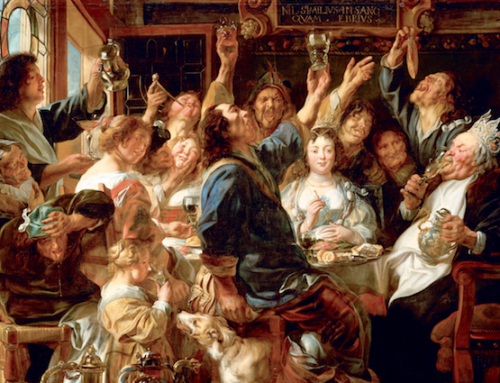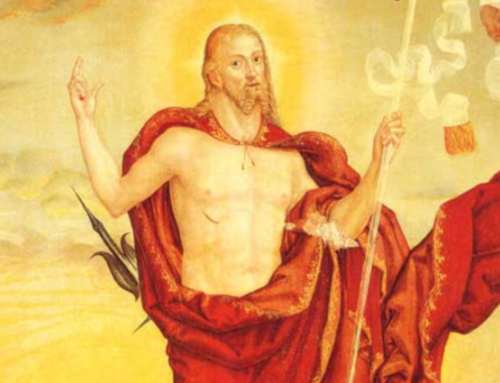It may seem paradoxical to find out that one of the great clarion calls of individuality, modernism, and liberality—“Be yourself”—turns out to be a profound declaration of classical ethics.
“Stay true. Be you.” “Stay true to yourself.” “Be who you are.” “Just be yourself.” “You do you.” These slogans are part of the fundamental fabric of our society. They are echoed in popular music and books. So many movies, especially children’s movies, portray heroes and heroines who dream of throwing off the shackles of societal norms and a monotonous, ordinary life to go into the great wide open and discover or live out their true selves. And while this theme is wielded as a sword of the selfie, individualist, self-esteem worshipping society, it actually sounds similar to a sentiment echoed throughout the ages from wise men and saints. “Become who you are,” ordered Pindar. “Be who you are, and be that well,” instructed St. Francis de Sales. “Not to be one’s self, as God created you, is despair,” warned Kierkegaard.
A phrase that usually goes along with “be yourself” is another me-culture slogan: “You can be whatever you want.” And while “be yourself” turns out to be immensely classical when looked at philosophically, the idea that one can be whatever he wants turns out to be wholly irrational. A human cannot ever be anything other than a human, and a human self can never be anyone other than himself. If it were possible to be something other than yourself, then you could be not-you, and the law of non-contradiction would fail. One of the fundamental principles of all rational thought tells us that we are who and what we are. The self that we are is inescapable, and any effort to be something or someone else will end in one of only three possibilities: some form of madness or else recognition of the error followed by correction or despair.
It doesn’t do anyone any good for a man to set out on a journey without knowing at least the general direction of where he is headed. If we want to be ourselves, then we have to form at least some notion of what this “self” is. The inscription above the door of the Delphic Oracle is at least as relevant today as it was for Socrates: “Know thyself.” In fact, if the diagnosis of the good doctor, Walker Percy, MD, is accurate, then the inscription is even more relevant today than it was then: “You live in a deranged age – more deranged than usual, because despite great scientific and technological advances, man has not the faintest idea of who he is or what he is doing.”
When we are exhorted to “be ourselves,” it is not that we are in danger of being someone or something other than ourselves, since that is not really possible, but that we are in danger of being less than ourselves. We cannot be anyone other than who we are, but we can fail at reaching the full potential of what we are. The self we need to avoid is the un-self, the false-self. It is not a matter of showing up to a wedding wearing someone else’s clothes, but of not wearing our own finest clothes.
The common understanding of “be yourself” is that you should follow your desires and dreams. “Be true to yourself” means that you should live according to your apparent personality and preferences. But Aristotle tells us, “The dreams of the good are better than ordinary men.” Our dreams, preferences, personalities, and desires change, and according to Aristotle (et al.) those traits depend on the quality of the person; in other words, our tastes and our expectations of the world are based on the foundation of the true self. The self is something deeper and more fundamental than the way our preferences express themselves. As that self develops, so will our dreams as well as our ability to achieve those dreams.
No boat can be a very good fishing boat, no matter how badly it wants to be a fishing boat, if it is not even seaworthy. A boat that fails at being a boat is only good for either the garbage or the museum; it is refuse or a novelty, fodder for the fire or mere decoration. People who fail at being themselves can only live in the world of appearances. So many of us are obsessed with how we look on social media or what other people say about us, but our life does not consist of how other people perceive us or what other people think about us. Seneca wrote, “Death falls heavy upon those who are known too much to others and too little to themselves.” Life falls heavy upon them, too. Appearance is a cramped space for free beings. If we know our essence and live up to it, then all of our other non-essential pursuits will flourish. Put first things first, and you get both first and second things. Put second things first, and you lose both. Lacking the foundation of a true self, many of us seek comfort in entertaining ourselves and others. We can have all the perseverance we want, but if we persevere in the wrong tasks, we will be like eggs smashing ourselves against a brick wall.
But worst of all is the fact that those who do not reach their potential are the ones who are least aware of their failure. Plato wrote, “The most damaging thing about stupidity is its self-satisfaction.” Those who are most in need of wisdom are the ones who are least aware of it. I have heard Peter Kreeft say, “There are two kinds of people in the world: the fools who think that they are wise, and the wise who know that they are fools.” It is only as we begin to get better that we realize how sick we are. Aristotle wrote, “The Supreme Good only appears good to the good man: vice perverts the mind and causes it to hold false views about the first principles of conduct. Hence it is clear that we cannot be prudent without being good.”
So, what is that true self? What is the nature of self-ness and how does one go about reaching his full potential? If we cannot get an answer from our immediate company, how can we know how to be ourselves? Allan Bloom wrote, “As it now stands, students have a good image of what a perfect body is and pursue it incessantly. But, deprived of literary guidance, they no longer have any image of a perfect soul, and hence do not long to have one. They do not even imagine that there is such a thing.” Literature can be our guide. The wise men and women who know what it means to reach our potential have left us their counsel in writing. Without their guidance, we have little hope of knowing what a perfect soul looks like or how to develop one.
In the best of those writers we find talk about virtue. The Greek word, arete, which is often translated as virtue can also be translated as excellence. The pattern of virtue or excellence laid out by the Ancient Greeks and modified only slightly by Christian philosophers in the Middle Ages give us a clear picture of what it looks like to reach our full potential and how to achieve it. To them, “be yourself” would have meant “be excellent” or “be virtuous.” These thinkers accomplished this insight by astutely observing the human person, examining the various essential faculties like the mind and will, and ascertaining the true purpose of each function. In the end, the human person seeks only one thing: happiness. This happiness they speak of is not the result of a particular set of circumstances or surroundings, but is the lasting effect of being excellent. St. Thomas Aquinas wrote, “The unhappy man will not be made happy by any additional good fortune.” To be less than yourself is misery, no matter your circumstances. To be yourself, fully yourself, is strength and wholeness. As C.S. Lewis phrased it, it is to be “drenched in joy.”
This true self cannot be achieved through any outward manipulation of our environment. No pill, operation, mind-washing, set of circumstances, lack of constraints or externally imposed limitations will achieve this for us. We can only cultivate within ourselves the freedom to be excellent, which is what true freedom is. In fact, the saints among the sages claim that we cannot become perfect in virtue on our own steam apart from Divine Assistance. Nevertheless, a free self is not one that can do whatever it wants; a truly free self is free from the internal bonds that hold it to a mediocre life and slavery to every passing whim so that it has the ability to live excellently.
It may seem paradoxical to find out that one of the great clarion calls of individuality, modernism, and liberality—“Be yourself”—turns out to be a profound declaration of classical ethics, but these considerations may end in an even stranger way. The wisest man I will quote in this essay once said, “Everyone who loves his life loses it, but everyone who hates his life in this world will keep it for eternal life. Unless a grain of wheat falls to the earth and dies, it remains alone, but if it dies it bears much fruit.” The self is most itself when it is given away. The emptying self is the fullest self. When we are selfish, we are actually being un-self-ish, un-selfing ourselves by clinging to our own comfort, pleasure, and entertainment. Selfish acts are the acts of false selves and non-selves. But our unselfish acts are the most self-ish; that is to say they are the most like acts that real selves do. When we are unselfish, we clothe ourselves with a true self. To be self-ie we have to be other-ie. The self exists to be given away. As one of the great selves of fictional characters, the Bishop in Les Miserables said, “I am not in the world to care for myself, but for souls.” The self is a gift given freely to us so that we might give it away freely.
Be yourself, and be self-ish.
The Imaginative Conservative applies the principle of appreciation to the discussion of culture and politics—we approach dialogue with magnanimity rather than with mere civility. Will you help us remain a refreshing oasis in the increasingly contentious arena of modern discourse? Please consider donating now.
The featured is a detail from “Socrates Looking in a Mirror” (c. mid-seventeenth century) by Bernard Vaillant (1625-1670). This file is made available under the Creative Commons CC0 1.0 Universal Public Domain Dedication, courtesy of Wikimedia Commons. It has been brightened for clarity.








Leave A Comment